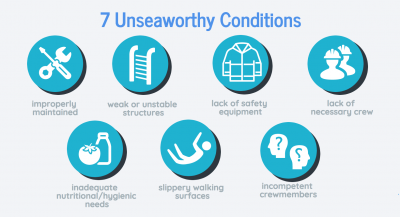- Maritime Cases
- Maritime Injuries
- Admiralty Laws
- How Claims Work
- During Your Case
- Hiring an Attorney
- Attorneys
- About The Young Firm
- Helpful Info
- Resources
- Client Portal Hub
Get Answers. Move Forward.
504-680-4100
If you’re considering filing a Jones Act claim of unseaworthiness against the owner of a vessel where you worked, you’ll need to show evidence of how the vessel’s condition created the potential for your injury accident to occur.
The following are 7 unseaworthy conditions that could result in Jones Act claims against vessel owners or manufacturers:

Showing proof of these conditions can be difficult, as many of them are only evidenced by documentation the vessel owner holds. The vessel owner, in most cases, won’t be eager to give you access to these documents, which is where a New Orleans lawyer for Jones Act claims can help.
A maritime injury law firm in Louisiana may have more resources to draw from and power to obtain necessary evidence than you’d have alone. Jones Act lawyers who handle offshore injury claims against employers can help you handle claims against vessel owners when their unseaworthy vessel causes your injuries.
Put shortly, yes, all Jones Act vessels must be seaworthy. If a vessel that was unseaworthy contributed to an accident that caused your injury, you may be able to file a claim under both general maritime law and the Jones Act of 1920. Contact a team of boat accident lawyers to learn more about these statutes and how they can affect the outcome of your injury claim.
The Jones Act of 1920, also called the Merchant Marine Act, is a federal law that governs maritime commerce and accident procedure. Under that act, any Jones Act vessels are defined as any of the following:
General maritime law stipulates that any vessel owner must ensure that the vessel, along with any accessories or equipment aboard the vessel, is “seaworthy” and “reasonably fit for its intended purpose.”
What this means is that any equipment malfunction on the vessel constitutes a breach of the ordinance that vessels be seaworthy. As such, you can file a general maritime claim under the doctrine of seaworthiness, as well as a Jones Act claim if you qualify as a Jones Act seaman.
The doctrine of seaworthiness applies strictly and solely to the owner of the vessel upon which you were injured. A team of boat accident lawyers can help you with your claim after a boating injury.
A New Orleans Lawyer Can Help With Jones Act Claims
The Jones Act law provides you with certain protections your employer may not want you to know about. If you suffer a maritime injury a law firm in Louisiana like The Young Firm in New Orleans has Jones Act lawyers that can help you with Jones Act claims.
Though we are based in Louisiana, we are ready and able to help injured victims throughout the U.S. Order our free Maritime Injury Law guide and/or our guide to what to do when you are injured offshore to learn all about your rights as an injured worker.
When you are ready to get started with your offshore accident injury case, we urge you to contact us today for a FREE case evaluation –call toll-free at 504-680-4100.
More articles on the Jones Act and vessel conditions: